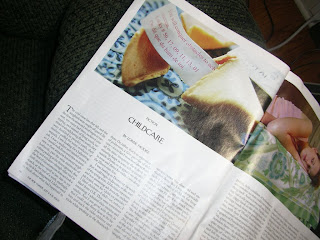A Short Story in the New Yorker: You Can Bet the Author Put in Her Time Learning her craft.
Note (December 14, 2010): I was just called a "schmuck" by a reader of this blog who pointed out that it's called the 10,000-hour rule, not the 1000-hour rule as I had originally written. The accuser is right of course and I'm sorry I offended him so deeply. In my schmucky defense, I'll say that when I first heard about it, I was told it was the 1000-hour rule and I Googled it and indeed found reference to a 1000-hour rule but was passed on to another article about a 10,000-hour rule. Why, when I wrote the blog I referred to it as the 1000-hour rufle is not known to me. I sit corrected.
There's an idea going around out there that says in order to be a pro at something--you know, ready for prime time--you need to practice something for at least a 10,000 hours. It's called the 10,000 Hour Rule and it's being applied to business dealings.
But, I figure it could apply to any profession that has difficult skills to master. Say like writing. The boom in self-publishing companies has fed off the would-be writer's desire to bypass the skill-aquiring phase of becoming a writer and moving right into the Steven King-fame-and-fortune phase of writing. After all, they've been writing since they were kids. Learned how to do it in 1st grade. They write on FaceBook and they write lottsa emails. So can writing a novel or a short story be much different?
Let me think about that for a minute. Yes, writing a publishable novel or an short story that meets the critical standards of literary magazines will take more skill than writing an email to you friend in Duluth.
There are important aspects to writing a novel that exceed those of your average email. Take plotting, for example. You've got an idea and then you've got to spread that idea out over 350 pages and it's got to be coherent, and it's got to be written in powerful, or lyrical, or muscular, or spare and lovely prose. It's got to have an arc, a building up, unforgettable scenes, a climax, a denoument. It's got to grab the reader and hang on to him or her for many, many hours.
Then there are characters. Among all the muscular, lyrical, or spare and lovely prose, there need to be people that jump off the page, people whose story is worth telling, people who the reader will remember for years to come, or maybe, if the writer is good enough, for the rest of their lives. People like Huckleberry Finn or Ishmael or Scout or Scarlet or Hamlet.
We need at least 10,000 hours to get there, to climb up to that level of skill. There are those who can do it in less, but they're the rare ones. There are those who couldn't do it in 100,000 hours. They are, alas, much more common.

That's the 10,000 hour rule, schmuck.
ReplyDelete